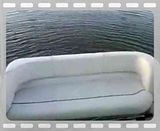obsessive
New Member
I have a question about our 99' 240DA with the 5.7L TBI engine.
The boat does not smoke directly on startup, but if the enigne is not up to or near operating temperature, and you blip the throttle (taking it up to 2-3K RPM - returning it immediately to idle) I get some light bluish smoke out of the exhaust as the RPM's fall. The smoke smells like unburnt fuel.
It will not do this when warmed up all the way.
Is it because it's running rich because it's not up to operating temp when the throttle is closed quickly - or something else? I'm not too up to speed on the throttle body GM's and how they react to stuff like this during the warmup cycle.
The engine has 430 hours, and the oil is clean - I use about 1/2QT or less during a season.
The boat does not smoke directly on startup, but if the enigne is not up to or near operating temperature, and you blip the throttle (taking it up to 2-3K RPM - returning it immediately to idle) I get some light bluish smoke out of the exhaust as the RPM's fall. The smoke smells like unburnt fuel.
It will not do this when warmed up all the way.
Is it because it's running rich because it's not up to operating temp when the throttle is closed quickly - or something else? I'm not too up to speed on the throttle body GM's and how they react to stuff like this during the warmup cycle.
The engine has 430 hours, and the oil is clean - I use about 1/2QT or less during a season.





